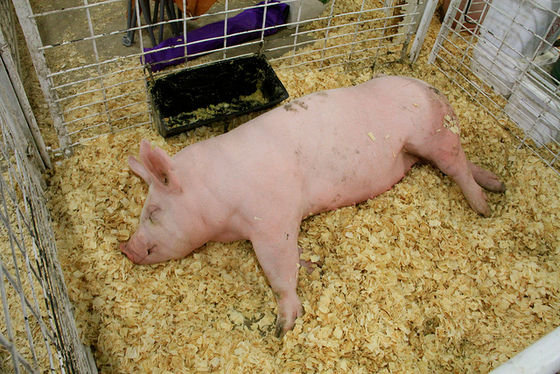"Xenotransplantation" transplanting pig heart into human beings approaches reality, succeeded in living for 945 days

ByTim Geers
The most difficult part of human organ transplantation is finding donors that provide organs. In transplant surgery, it is often necessary to wait anyway until a donor is found, and that period does not end in one or two years. A new technology that might be able to overcome the current state of such transplant surgery is "Xenotransplantation"is. As the name implies, it is to transplant organs from animals of other species which are not human beings, and it is obvious that the latest research has succeeded in transplanting pig hearts to baboons and keeping them functioning for 945 days It is becoming.
Chimeric 2C10R4 anti-CD40 antibody therapy is critical for long-term survival of GTKO.hCD46.hTBM pig-to-primate cardiac xenograft: Nature Communications: Nature Publishing Group
http://www.nature.com/ncomms/2016/160405/ncomms11138/full/ncomms11138.html
Scientists are one step closer to using pig hearts for human transplants | The Verge
http://www.theverge.com/2016/4/5/11360702/xenotransplant-pig-heart-baboon-revivicor-nih
On 5th April 2016Nature CommunicationsAccording to a paper published in 9, 945 days (approximately 2 years and 7 months), while keeping the two hearts of the original baboon's heart and the transplanted heart functioning as the pig's heart transplanted into the body of baboons, It was revealed that succeeded in keeping the baboon alive. This is an important step toward practical application of "xenotransplantation" to transplant pig organs to humans.
The procedure necessary for transplanting the pig's heart inside the baboon's body is to administer "a drug suitable for xenotransplantation" in the condition that the pig's heart is alive. In addition, pigs themselves which provide organs are also genetically modified to "state where the organ is biologically likely to be compatible with human organs".
In the past, the same research group conducted a similar experiment and succeeded in letting the heart of the baby function in baboon's body for 500 days, but this time we succeeded to make it function for about 945 days, which is about twice that. In the experiment, we succeeded to make the transplanted pig heart work for more than two years, but by administering the drug to the transplanted baboon, we can further extend this functioning period. I will.
In addition, the research group will conduct experiments to completely replace the heart of pigs with the heart of pigs next year using "drugs suitable for xenotransplantation". If it succeeds in this experiment, it will be a big step toward realizing the final goal of "transplanting pig's organs to human beings". And if that happens, it may be a great help to overcome the current situation that about 8000 people die each year in the donor waiting period of transplant surgery.

ByGlobal Panorama
It is a "xenotransplant" that has the potential to save the lives of many people, but this idea has existed since the 1960s. Initial xenograft seems to have transplanted organs of baboons and chimpanzees close to seeds to humans, but in the end the transplanted human body has rejected and the operation has failed. Modern scientists are working on the problem to eliminate this rejection, and swine organs are used instead of organs of chimpanzees and babies for transplantation.
Why is pig heart being used in xenotransplantation experiments, various studies in the past have made porcine heart sizes relatively close to human beings, pigs grow faster and procure more easily, furthermore Has a lower risk of infection with a virus that threatens human beings when transplanted than other animals and has been treated as livestock since long ago and ethical resistance to heart transplantation is lower than that of other animals It was because it became clear.
In 2002, two biotechnology companies produced organs of pigs that would not cause rejection in the human body,AnnouncementDid. However, transplanting these organs into baboons reveals that rejection occurs over time. Because of these circumstances, studies on xenografts have been searching for means to prevent rejection and blood clotting, but for the moment it has succeeded in suppressing a considerable part by gene recombination and medication That is why.

ByDaniel X. O'Neil
Although the content of this research has been suggestive, some researchers say that it is very difficult to find combinations of drugs and genetic changes to prevent human rejection. further,National HeartMuhammad Mohewdin, a transplant surgeon, commented, "Human being transplanted may be infected with an animal virus, so it is too dangerous."
However, Arthur Kaplan, a bioethicologist at New York University, said, "We have acquired new genome editing technology, the immune system has gained a lot of attention as a result of its emergence, xenotransplantation should be possible." And expressed a position in favor of xenotransplantation. In addition, Mr. Peter Kauan, who is conducting immunology research, commented, "There has been no report that none of the samples that survived for a long time after transplantation had been infected with a new species of swine virus" and commented on the study of xenotransplantation I support it.
Related Posts:







